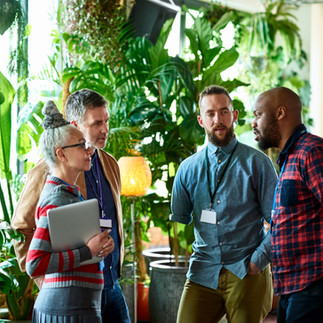Navigating the Challenges and Benefits of DEI Work Outside Your Main Role
- susannelifelines
- Dec 13, 2023
- 4 min read
Updated: Feb 15, 2025
Diversity, Equity, and Inclusion (DEI) work within a corporate environment is mostly carried out on top of designated roles. As I've gone back to work after burnout I requested to help with my departments gender balance as one of the very few senior women employed. Although we've seen great progress in employee satisfaction as part of this work I was definitely not ready for the emotional toll this work would take.
Benefits: A Positive Ripple Effect on Employee Satisfaction
My department has seen a marked and significant upturn in our DEI related employee satisfaction scores on our anonymous feedback systems since we have started this focus on DEI. People are sharing that they feel more supported and able to open up to their colleagues about the issues they are facing across diversity lenses. We all know how important diversity and inclusion is to organisations, both to individual employees and in turn to the bottom line, albeit, no company should be undertaking this work for profit alone.
For those, like me, spearheading DEI initiatives, the intrinsic rewards are massive. The sense of making a genuine difference, the ability to amplify the voices of marginalised colleagues, and the empowerment to challenge the status quo are hugely rewarding. It's about leaning in, providing support, and championing inclusivity from within the fabric of the company. This, however, can come at a cost to the individuals without the right support systems.
Challenges: Navigating Complexities Beyond the Role
What I personally, as a rather sensitive person, have found hardest is the emotional burden of hearing the experiences of colleagues from minority groups while not always being able to help directly with their struggles. This has really taken its toll and I'm working through how I can best release this burden whilst staying empathetic and doing what I can to help colleagues and create a better environment for them. There are support networks and supervision in place for therapists and coaches but we don't have the same for people doing DEI work which I think needs to change. This work, like many other careers/jobs like social and charity work, carries a heavy emotional burden which we need to take seriously.
This emotional weight is often coupled with a responsibility of challenging upwards, especially when the role is part of the day job and can create a sense of isolation in the fight for inclusivity. Sitting around a table where you are one of only a few people that look, think, feel like you is hard and lonely especially when you feel like you hold the responsibility for changing everything that is unjust. What I've found the key to be here is leaning on those few people around you of the same mindset and setting up informal support groups to share the burden.
Furthermore, being one of the few senior females or underrepresented individuals in leadership positions adds another layer of pressure. The weight of representing an entire group of employees can be overwhelming, magnifying the already considerable responsibility of driving DEI efforts. As part of this there is a high pressure to be a 'perfect' role model and you can really feel all those eyes looking up to you. This, added up with the additional workload of bringing in, and up, the other woman around you through representation at interviews, mentoring, public speaking, panels etc can be a real driver towards burnout. 'Luckily' I've already been there and have no plans of going back!
The final thing I've been feeling recently is the self-imposed pressure to always say the right thing. I'd like to think I'm very good at holding space for others always allowing 'clumsy' questions and explorations of fears. I've realised though that I've not been creating this for myself. I need to accept that I'm on this journey as much as others around me. I'm allowed to slip up, say the wrong thing and ask clumsy questions in the hope/knowledge that I've created a safe enough space for those around me to feel able to challenge me.
Conclusion: Nurturing Inclusivity While Navigating Challenges
At so many organisations 'we' rely on colleagues from minority group to undertake DEI work which needs to change. The responsibility should always be on those in the majority to educate themselves and make companies and teams a safe and inclusive place to work. We've got some way to go to get there and it's imperative to provide support structures, foster allyship, and advocating for a more inclusive culture that values the contributions of every individual.
I've found doing this work hugely rewarding despite the challenges and it's been worth dedicating a few therapy sessions to cry out the emotional burden for the reward of seeing colleagues more comfortable and able to bring their full selves to work. Ultimately, the journey of advocating for diversity, equity, and inclusion, even when it's not your main role, is vital in shaping a workplace where every employee feels empowered, valued, and respected and I'm so proud to be a part of that.
I hope you’ve enyoed reading this post. If you’re interested in reading more please do subscribe on the main page to follow along on the journey 😊





Comments